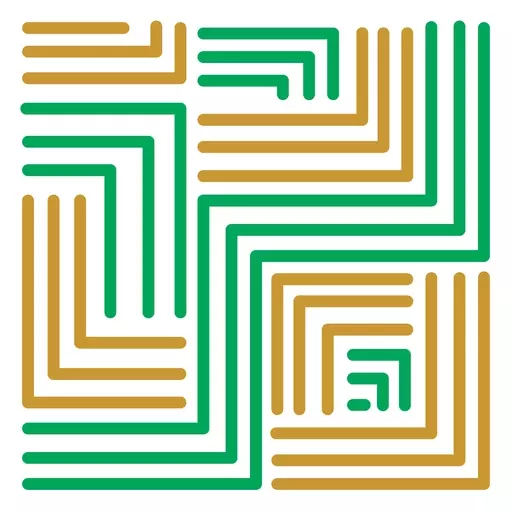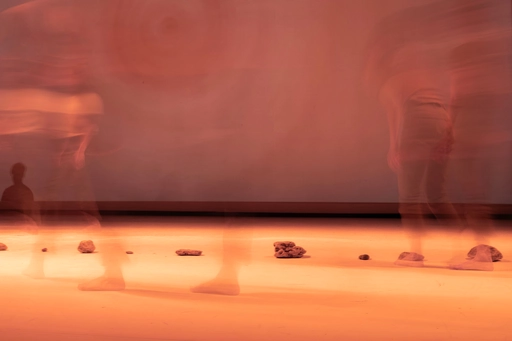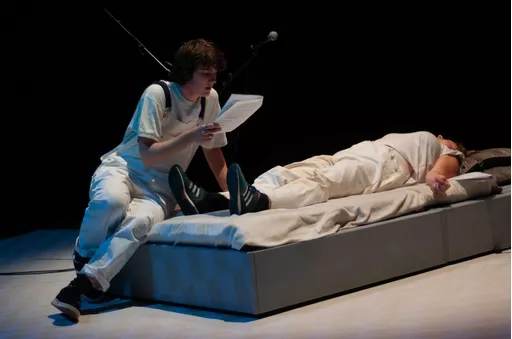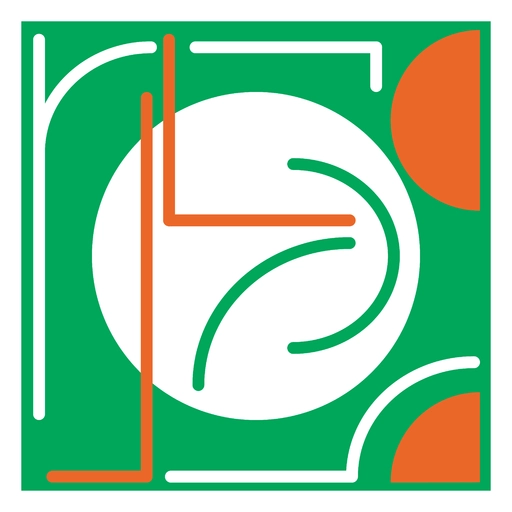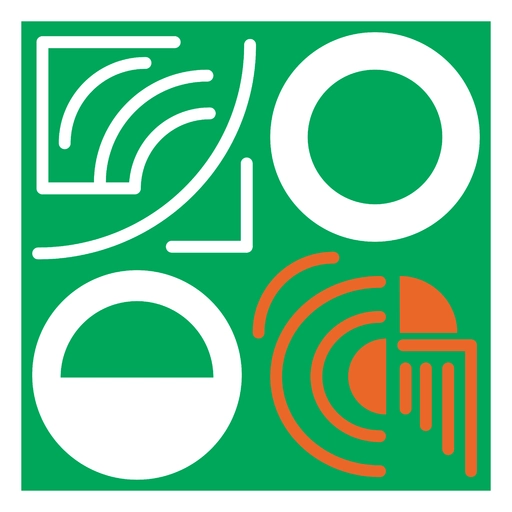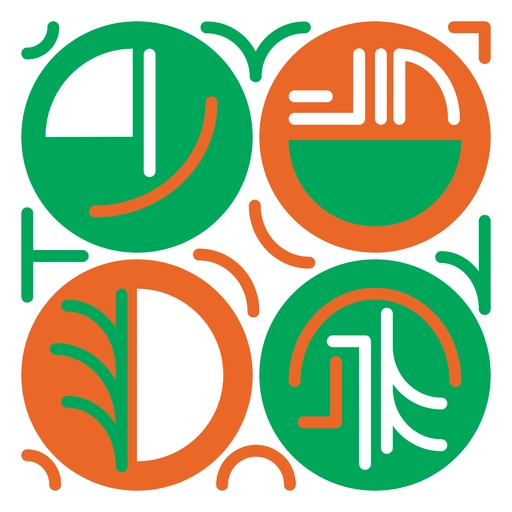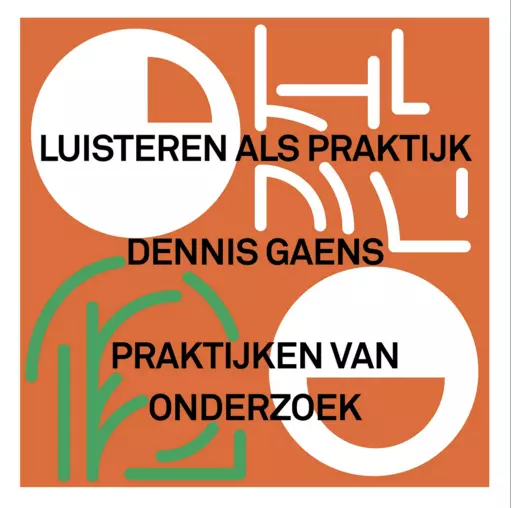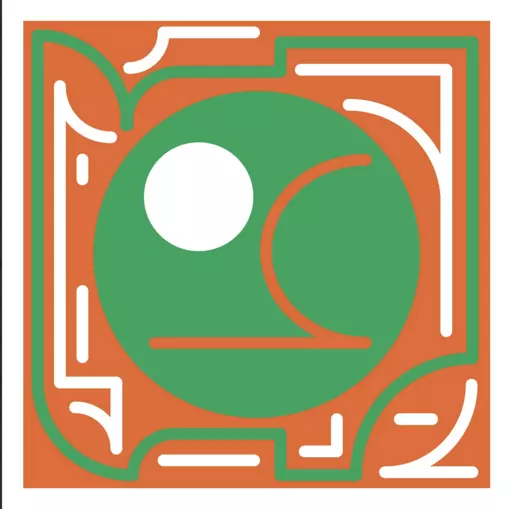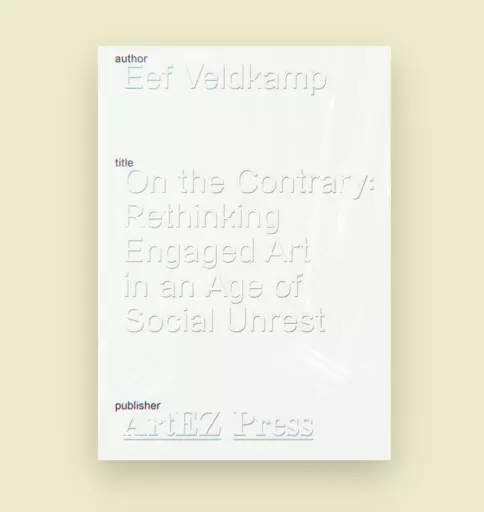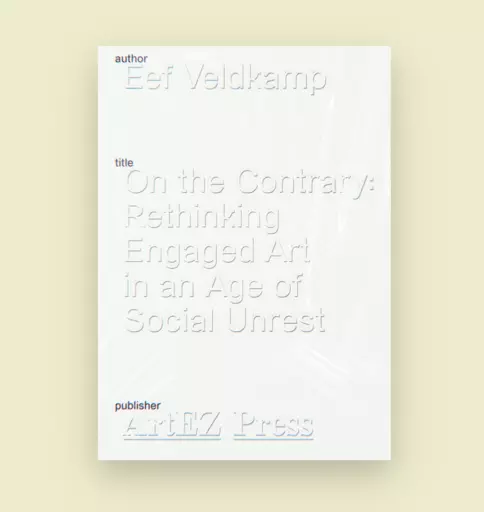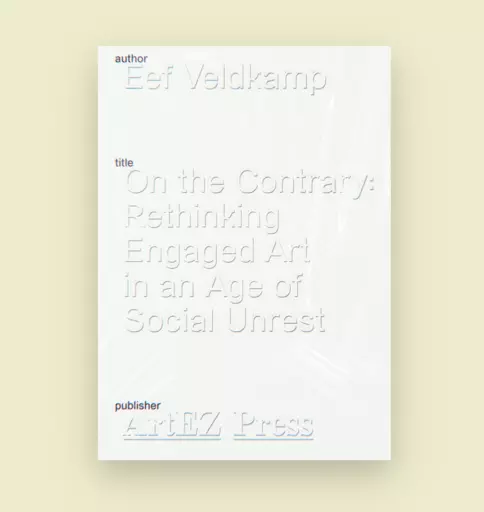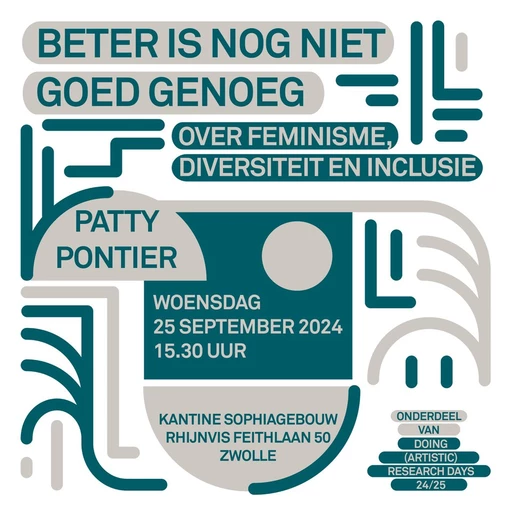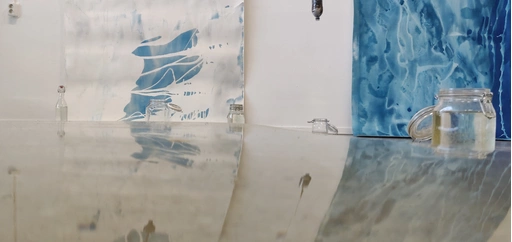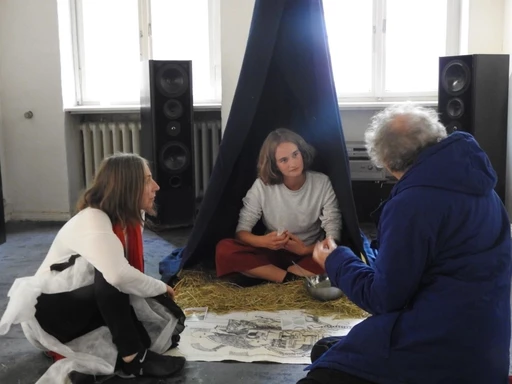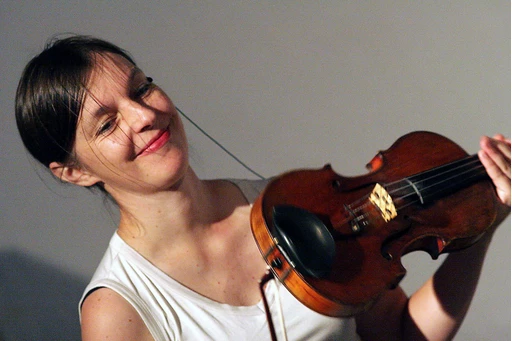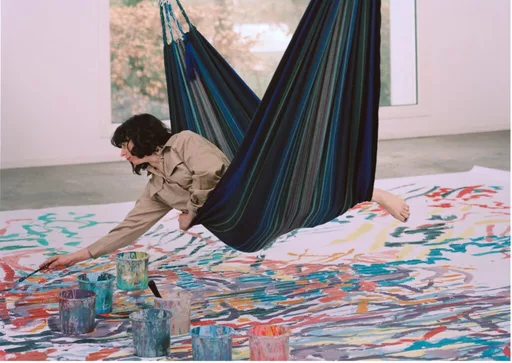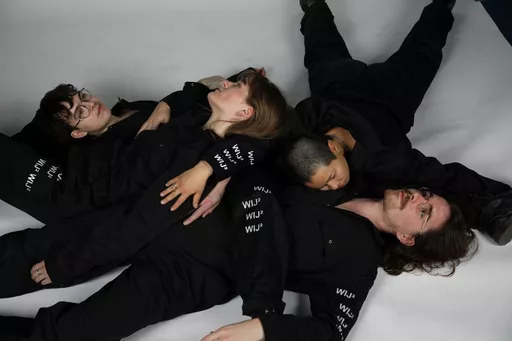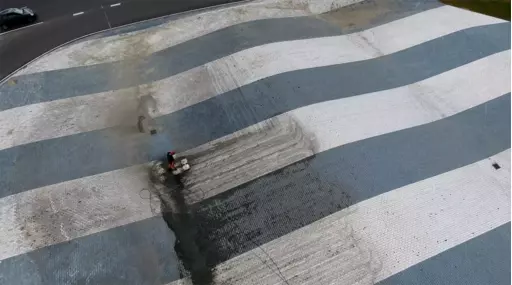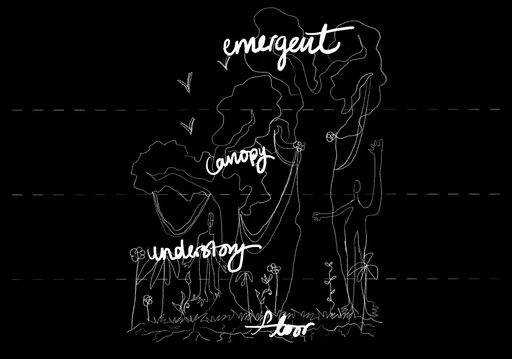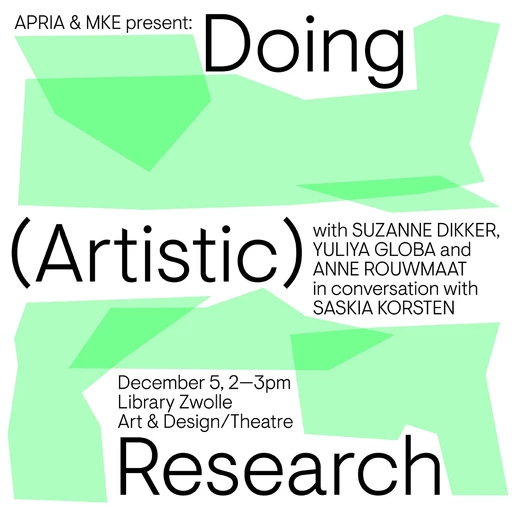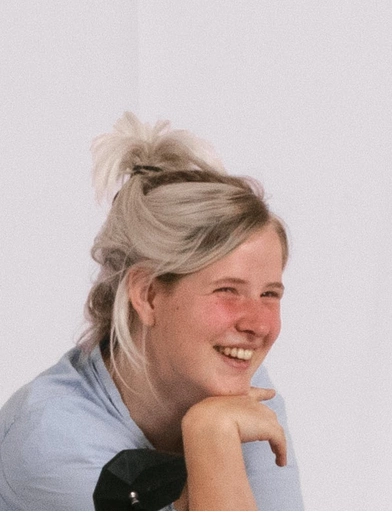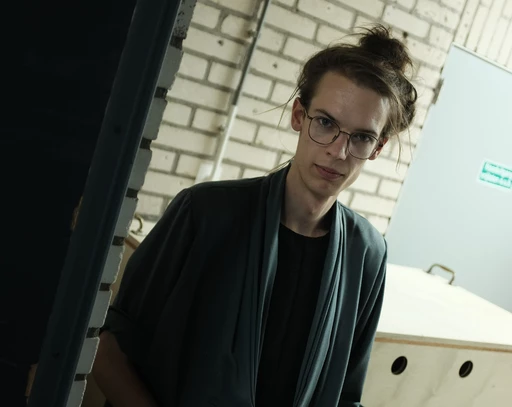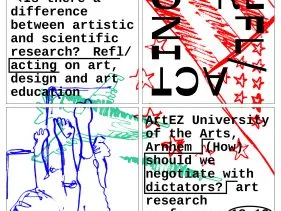
Fabulation as Artistic Research Method
Ways of Engaging with Multiple Others
11 dec. 2024 Boekhandel Hijman Ongerijmd → Grote Oord 15 6811 GA Arnhem
(archive)
taal: Nederlands, English
English below
Deze dag is georganiseerd voor iedereen binnen ArtEZ met interesse in fabulatie en artistiek onderzoek. Het programma is verbonden aan de Honours Lab-track Fabulation Lab en maakt deel uit van het ArtEZ-programma Doing (Artistic) Research Days 24/25.
*Heb je je aangemeld voor dit event dan ben je van harte welkom, ook als je geen bevestigingsmail hebt ontvangen. Door een bug in de website kan het zijn dat een bevestigingsmail niet is verzonden. Voor meer informatie over je inschrijving mail naar: studiumgenerale@artez.nl Voor meer informatie over deze dag mail: jo.christenhusz@artez.nl
Deze dag is georganiseerd voor iedereen binnen ArtEZ met interesse in fabulatie en artistiek onderzoek. Het programma is verbonden aan de Honours Lab-track Fabulation Lab en maakt deel uit van het ArtEZ-programma Doing (Artistic) Research Days 24/25.
*Heb je je aangemeld voor dit event dan ben je van harte welkom, ook als je geen bevestigingsmail hebt ontvangen. Door een bug in de website kan het zijn dat een bevestigingsmail niet is verzonden. Voor meer informatie over je inschrijving mail naar: studiumgenerale@artez.nl Voor meer informatie over deze dag mail: jo.christenhusz@artez.nl
Lezingen & Workshops: Fabulation as Artistic Research Method
Woensdag 11 december | 09.30-16.30
Boekhandel Hijman Ongerijmd Grote Oord 15, Arnhem
door: ArtEZ Lectoraat Theorie in de Kunsten
Het ochtendprogramma begint met een lezing van Simon O'Sullivan (Professor Art Theory and Practice aan Goldsmiths) over fictioning en myth-work, gevolgd door een activiteit over de rol van fabulatie in de roman Onder Asfalt van auteur Maarten van der Graaff. In de middag vinden er praktische workshops plaats, geleid door artistiek onderzoeker Martine van Lubeek en auteur Odette van Heesbeen.
Bij zowel Haraway als Deleuze wordt fabulation niet gepresenteerd als een strikt methodologisch kader, maar eerder als een manier om met de complexiteit van onze huidige wereld om te gaan; een manier van relateren en reflecteren via ‘fictioning’, die onze complexe verstrengeling met zowel menselijke als niet-menselijke anderen erkent. Als zodanig verwijst fabulatie naar transdisciplinaire manieren van verhalen vertellen en artistiek onderzoek doen die de conventionele grenzen tussen feit en fictie, realisme en fantasie overstijgen en traditionele categorieën en hiërarchieën (natuur-cultuur, mens-technologie) bevragen. Fabulatie is een manier om naar de toekomst te kijken, maar is geen naïeve utopie. In plaats daarvan roept fabulatie op tot een actieve betrokkenheid bij de complexiteiten van het heden—wat Haraway beschrijft als 'staying with the trouble'.
Middels een hybride seminar dat bestaat uit zowel lezingen als workshops, wil het ArtEZ Lectoraat Theorie in de Kunsten een gemeenschap vormen rondom het thema fabulatie. Tijdens het seminar zullen we gezamenlijk onderzoeken wat fabulatie kan betekenen in diverse kunstpraktijken en hoe het begrip zich verhoudt tot vergelijkbare noties zoals fictioning, mythevorming en storytelling.
Woensdag 11 december | 09.30-16.30
Boekhandel Hijman Ongerijmd Grote Oord 15, Arnhem
door: ArtEZ Lectoraat Theorie in de Kunsten
Hybride seminar
Middels een hybride seminar dat bestaat uit zowel lezingen als workshops, wil het ArtEZ Lectoraat Theorie in de Kunsten een gemeenschap vormen rondom het thema fabulatie. Tijdens het seminar zullen we gezamenlijk onderzoeken wat fabulatie kan betekenen in diverse kunstpraktijken en hoe het begrip zich verhoudt tot vergelijkbare noties zoals fictioning, mythevorming en storytelling.Het ochtendprogramma begint met een lezing van Simon O'Sullivan (Professor Art Theory and Practice aan Goldsmiths) over fictioning en myth-work, gevolgd door een activiteit over de rol van fabulatie in de roman Onder Asfalt van auteur Maarten van der Graaff. In de middag vinden er praktische workshops plaats, geleid door artistiek onderzoeker Martine van Lubeek en auteur Odette van Heesbeen.
Fabulation as Artistic Research Method - Ways of Engaging with Multiple Others
In de afgelopen jaren heeft het begrip ‘fabulation’ steeds meer aandacht gekregen in diverse kunstpraktijken en artistiek onderzoek. Een belangrijke invloed op deze groeiende belangstelling is het recente werk van Donna Haraway, die in Staying with the Trouble 'speculatieve fabulation' introduceert als onderdeel van een bredere verzameling praktijken die zij ‘SF’ noemt. De oorsprong van het begrip fabulation gaat echter ook terug naar het werk van Gilles Deleuze, die op zijn beurt voortbouwt op ideeën van Henri Bergson.Bij zowel Haraway als Deleuze wordt fabulation niet gepresenteerd als een strikt methodologisch kader, maar eerder als een manier om met de complexiteit van onze huidige wereld om te gaan; een manier van relateren en reflecteren via ‘fictioning’, die onze complexe verstrengeling met zowel menselijke als niet-menselijke anderen erkent. Als zodanig verwijst fabulatie naar transdisciplinaire manieren van verhalen vertellen en artistiek onderzoek doen die de conventionele grenzen tussen feit en fictie, realisme en fantasie overstijgen en traditionele categorieën en hiërarchieën (natuur-cultuur, mens-technologie) bevragen. Fabulatie is een manier om naar de toekomst te kijken, maar is geen naïeve utopie. In plaats daarvan roept fabulatie op tot een actieve betrokkenheid bij de complexiteiten van het heden—wat Haraway beschrijft als 'staying with the trouble'.
Middels een hybride seminar dat bestaat uit zowel lezingen als workshops, wil het ArtEZ Lectoraat Theorie in de Kunsten een gemeenschap vormen rondom het thema fabulatie. Tijdens het seminar zullen we gezamenlijk onderzoeken wat fabulatie kan betekenen in diverse kunstpraktijken en hoe het begrip zich verhoudt tot vergelijkbare noties zoals fictioning, mythevorming en storytelling.
Programma:
9:30-10:00 Inloop
10:00-10:15 Opening
10:15-11:15 Simon O'Sullivan over fabulation en verwante begrippen als fictioning en myth-making
11:30-13:00 Maarten van der Graaff over zijn boek Onder Asfalt
13:00-14:00 Lunch
16:00-16:30 Afsluiting


This day is organised for anyone within ArtEZ with an interest in fabulation and artistic research. It is linked to the Honours Lab track Fabulation Lab and is part of the ArtEZ programme Doing (Artistic) Research Days 24/25.
*If you have registered for this event, you are welcome to attend even if you have not received a confirmation email. Due to a bug in the website, a confirmation email may not have been sent. For more information about your registration email: studiumgenerale@artez.nl For more information about this day email: jo.christenhusz@artez.nl
Lectures & Workshops: Fabulation as Artistic Research Method
Wednesday 11 December | 09.30-16.30
Bookshop Hijman Ongerijmd Grote Oord 15, Arnhem
by ArtEZ Lectoraat Theory in the Arts
The morning part of the program consists of a lecture by Simon O'Sullivan (Professor of Art Theory and Practice at Goldsmiths) on fictioning and myth-work, followed by an activity about how fabulation has played a role in the novel Onder Asfalt by author Maarten van der Graaff. In the afternoon, there will be practical workshops led by artistic researcher Martine van Lubeek and author Odette van Heesbeen.
With both Haraway and Deleuze, fabulation is not presented as a strict set of methodological guidelines, but rather as a mode of engaging with the complexities of our current world; a mode of relating and reflecting through fictioning, that is committed to recognizing our complex entanglements with multiple others, both human and nonhuman. Fabulation offers a way to engage in modes of trandisciplinary storytelling and critical exploration that transcend conventional boundaries between fact and fiction, realism and fantasy, and questions traditional categorizations and hierarchies, such as those between nature and culture, the human and the technological. Importantly, fabulation looks toward the future, but it is not a naive vision of utopia. Instead, it calls for an active engagement with the complexities of the present—what Haraway refers to as 'staying with the trouble'.
Wednesday 11 December | 09.30-16.30
Bookshop Hijman Ongerijmd Grote Oord 15, Arnhem
by ArtEZ Lectoraat Theory in the Arts
Fabulation
Through a hybrid seminar consisting of both lectures and workshops, the ArtEZ Professorship Theory in the Arts seeks to form a community centered around the theme of fabulation. During the seminar we will collectively inquire into the question of what fabulation can do in various art practices and how the concept relates to similar notions such as fictioning, myth-making, and storytelling. The morning part of the program consists of a lecture by Simon O'Sullivan (Professor of Art Theory and Practice at Goldsmiths) on fictioning and myth-work, followed by an activity about how fabulation has played a role in the novel Onder Asfalt by author Maarten van der Graaff. In the afternoon, there will be practical workshops led by artistic researcher Martine van Lubeek and author Odette van Heesbeen.
Fabulation as Artistic Research Method - Ways of Engaging with Multiple Others
In recent years, the notion of fabulation has gained prominence in art practices, artistic research, and the environmental humanities. A major influence on this growing interest has been the recent work of Donna Haraway, who in Staying with the Trouble presents 'speculative fabulation' as part of a broader set of practices she calls ‘SF.’ However, the notion of fabulation can also be traced back to the work of Gilles Deleuze, who in turn builds upon ideas of Henri Bergson. With both Haraway and Deleuze, fabulation is not presented as a strict set of methodological guidelines, but rather as a mode of engaging with the complexities of our current world; a mode of relating and reflecting through fictioning, that is committed to recognizing our complex entanglements with multiple others, both human and nonhuman. Fabulation offers a way to engage in modes of trandisciplinary storytelling and critical exploration that transcend conventional boundaries between fact and fiction, realism and fantasy, and questions traditional categorizations and hierarchies, such as those between nature and culture, the human and the technological. Importantly, fabulation looks toward the future, but it is not a naive vision of utopia. Instead, it calls for an active engagement with the complexities of the present—what Haraway refers to as 'staying with the trouble'.
Programme
9:30-10:00 Walk-in
10:00-10:15 Opening
10:15-11:15 Simon O'Sullivan on fabulation and related concepts of fictioning and myth-making
11:30-13:00 Maarten van der Graaff on his book Onder Asfalt (Under Asphalt)
13:00-14:00 Lunch
16:00-16:30 Closing
related content
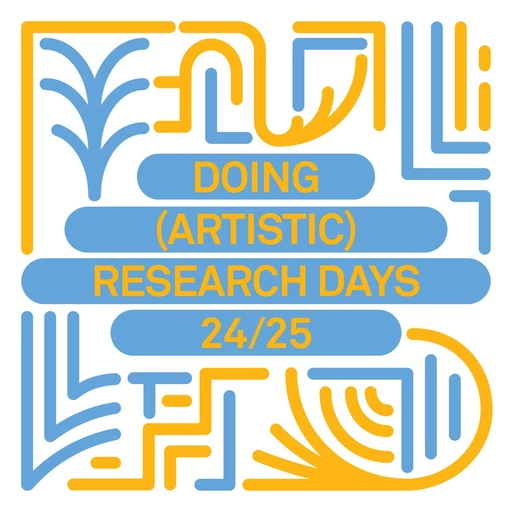
Doing (Artistic) Research Days 24/25
ArtEZ programma over artistiek onderzoek doen

Martine van Lubeek
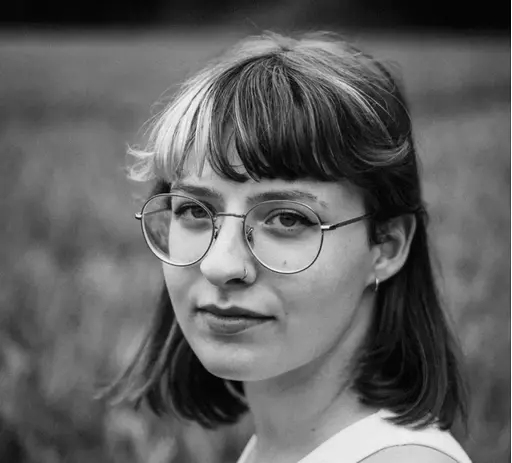
Odette van Heesbeen
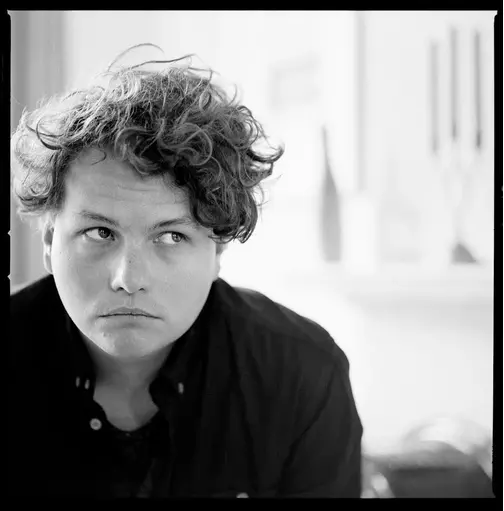
Maarten van der Graaff
more in this series:
16 mei 2025 - Research in and through the arts
Re-contextualising default narratives in collected content
26 mrt. 2025 - Research in and through the arts
APRIA Lecture and Workshop with Feli Navarro & YiLing Hung, Arnhem
25 mrt. 2025 - Research in and through the arts
APRIA Lecture and Workshop with Feli Navarro & YiLing Hung, Zwolle
05 feb. 2025 - Research in and through the arts
The Performance Night - Art & Technology
01 feb. 2025 - Research in and through the arts
Water’s Endlessness: the interview as research method in an expanded field of interlocutors
29 jan. 2025 - Research in and through the arts
Oneigenlijk gebruik; Een praktijkuitwerking van de kunstfilosofie van de kritische theorie
21 jan. 2025 - Research in and through the arts
Atlas van verhalen; Verhalen in kaart en (an)archief
17 jan. 2025 - Research in and through the arts
Luisteren als praktijk
09 jan. 2025 - Research in and through the arts
Live event: Provotyping Futures & (Non) Human Capital
17 dec. 2024 - Research in and through the arts
Listening and serendipity as actors in improvisation
12 dec. 2024 - Research in and through the arts
Onderzoek voor onderwijsontwikkeling
12 dec. 2024 - Research in and through the arts
Online event: Provotyping Futures & (Non) Human Capital
12 dec. 2024 - Research in and through the arts
Master Exchange Research Day(s) 2024 by Corpo-real
04 dec. 2024 - Research in and through the arts
Practicing Criticality
29 nov. 2024 - Research in and through the arts
AI (Art Intelligence) and/or AI (Artificial Intelligence)
29 nov. 2024 - Research in and through the arts
Master Exchange Research Day(s) - by Qiyun Zheng
28 nov. 2024 - Research in and through the arts
Minisymposium: Prototyping Futures
06 nov. 2024 - Research in and through the arts
3. On the Contrary: Rethinking Engaged Art in an Age of Social Unrest
04 nov. 2024 - Research in and through the arts
Master Exchange Research Day(s)
17 okt. 2024 - Research in and through the arts
2. On the Contrary: Rethinking Engaged Art in an Age of Social Unrest
11 okt. 2024 - Research in and through the arts
1. On the Contrary: Rethinking Engaged Art in an Age of Social Unrest
25 sep. 2024 - Research in and through the arts
Lezing Patty Pontier: Beter is nog niet goed genoeg
25 apr. 2024 - Research in and through the arts
Niet-mensen als leraren
11 apr. 2024 - Research in and through the arts
Het toeval in de canon
31 okt. 2023 - Research in and through the arts
Artistic Practice as Means for Investigation in Artistic Research
28 sep. 2023 - Research in and through the arts
APRIA Represents: Doing (Artistic) Research
13 jun. 2023 - Research in and through the arts
Doing Artistic research: Collective Making invites WIJ²
30 mei 2023 - Research in and through the arts
Between Blue Waves and Green Corridors
20 apr. 2023 - Research in and through the arts
Rainforest as Methodology: Workshop with Cruda Collective
05 dec. 2022 - Research in and through the arts
Doing (Artistic) Research with Suzanne Dikker, Yuliya Globa and Anne Rouwmaat in conversation with Saskia Korsten
13 okt. 2022 - Research in and through the arts
Doing (Artistic) Research: Martine van Lubeek and Sharon Stewart
03 okt. 2022 - Research in and through the arts
Expositie en interview Stan Frijsinger (Alumnus Creative Writing 2022)
18 nov. 2016 - Research in and through the arts
